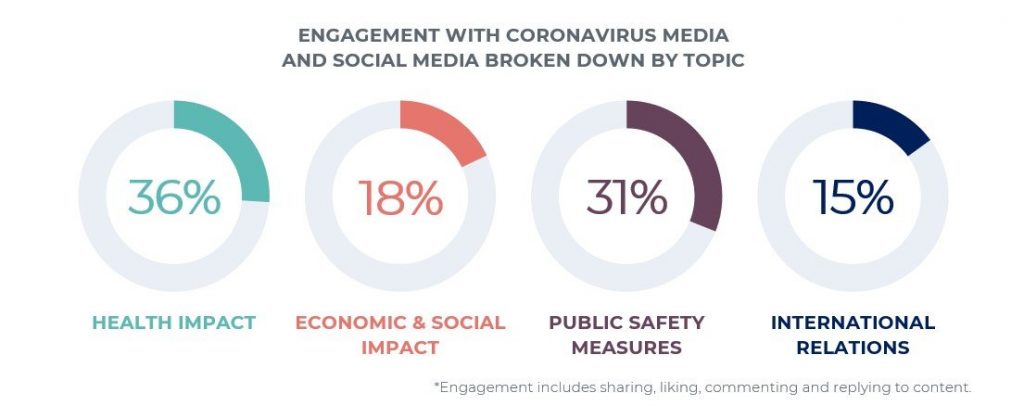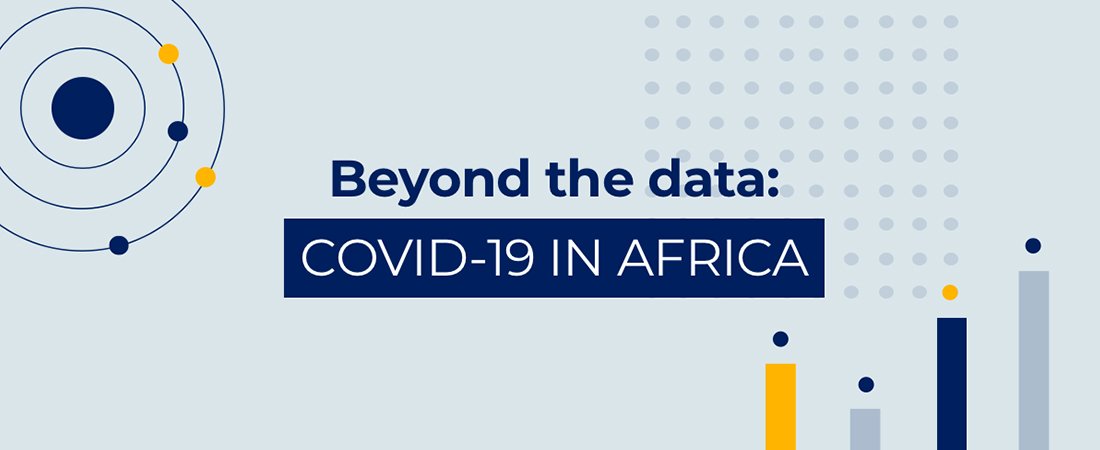What is driving the conversation?
At a glance, the conversation on COVID-19 across the continent is highly fragmented.
The analysis shows that these four key themes are driving the conversation and are having significant practical and political implications.

The charts depicts the distribution of the COVID-19 conversation across our four themes, by engagement.
In health, we can see a focus on the rumoured vaccination in Africa (140K engagements ), which has spread across the entire continent and beyond. Elsewhere the biggest story in the economic conversation has centred around Nigerian House of Representative proposals to grant two months of free electricity (6K engagements).
South Africa’s efficient lockdown (58.7K engagements) measures have been successful in managing the virus so far, as countries across the continent are also beginning to implement public safety measures.
Following calls from African leaders, suggestions of support from the G20 (5.4K) in terms of debt relief were cautiously welcomed while we await the full plan.
The leading story: controversies around alleged vaccine tests in Africa
The number of COVID-19 cases in Africa now surpasses 10,000 and Africa is estimated to be about two to three weeks away from the worst of the COVID-19 storm.
At the same time we have seen significant conversation around the health impact, more so than any other theme, driven primarily by a live interview in France with two doctors who claimed that COVID-19 vaccines should be tested in Africa. Since then, both doctors have apologised for their controversial statements.
Our data saw a negative sentiment more than triple around vaccine delivery in Africa following this interview.
The story of vaccine trials in Africa has now taken on a life of its own. Major figures have been implicated, conspiracy theories have proliferated across social media, and political leaders are having to respond.
With reactions from figures including Didier Drogba, the video of the interview was widely shared, particularly across West and Central Africa.
The surge of misinformation is not new. But today, fake news obstructs Africa’s immediate coronavirus response. Damaging stories about who is vulnerable to the virus, and how to fight it, are a serious problem on the continent.
From this single two minute intervention, the story has spiralled and has now reached the point where opposition leaders in Kenya and South Africa are demanding their governments do not engage in the alleged vaccine trial.
Already, Burkina Faso’s government has reassured citizens that the country will not take part. While the WHO Director-General, Tedros Adhanom Ghebreyesus, has also strongly condemned the comments.
A digital movement across the continent
Last week, a doctor in South Africa tweeted to her 120 followers that Africans were not to be guinea pigs for the vaccine.
This tweet then took off, and gradually became the #AfricansAreNotLabRats campaign, which is taking social media by storm.
In the last week, it has seen over 15K posts, which have been retweeted over 110,000 times. This is a growing movement, with some identifying themselves as leaders of the campaign at regional and national level.
How COVID-19 has already shifted the health debate in Africa
As the virus spreads in the coming weeks, so will unreliable news, consuming the majority of the communications bandwidth.
Without action, we risk losing progress on hard-won development problems such as HIV, TB and malaria – as noted last week by the WHO. The data shows, that the conversation around other health agendas is indeed decreasing in engagement week-on-week.
In the coming months, it will become ever more critical to ensure that these issues continue to be at the forefront of the global agenda, even as attention is understandably focused on the COVID-19 crisis at hand.
Portland’s expert Africa team in London and Nairobi will be producing weekly insights during this pandemic – Beyond the data: COVID-19 in Africa – analysing the conversation and policy impact in Africa.
Sign up here
Methodology
These insights are based on data obtained using the Talkwalker monitoring tool.
The tool tracks global coverage, engagement and reach across media and social media in multiple languages, to track the key conversations on COVID-19 in Africa.
Tailored search equations were set up to monitor trends in four key areas: health impact, economic and social impact, public safety measures, and international relations.
Results were taken from the period between 31st March and 7th April 2020.

